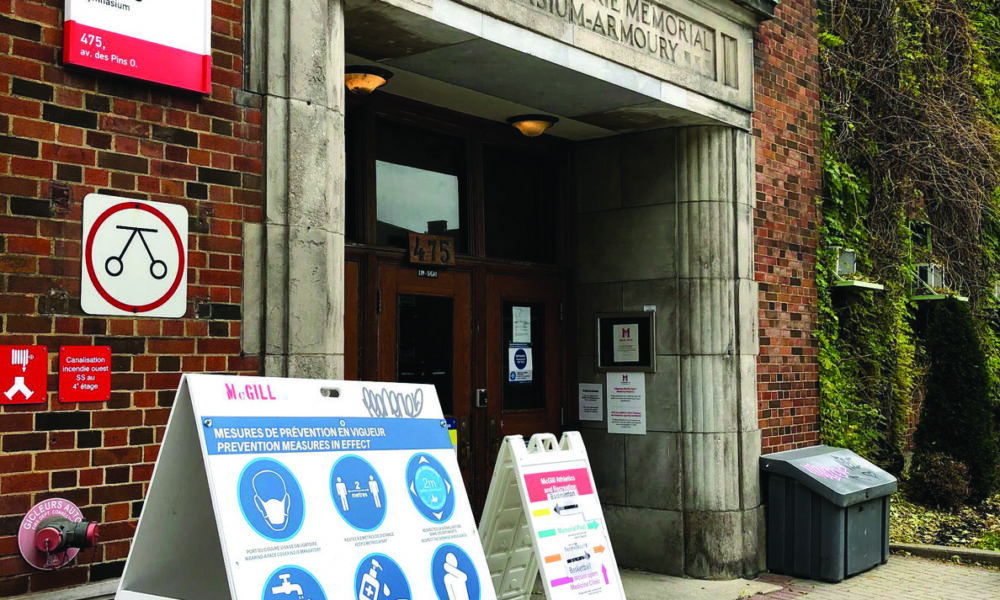McGill University is scheduled for a hearing before the Commission d’accès à l’information on Feb. 1 to bring a case against a former student. In a legal document obtained by The McGill Tribune, the university claims that the student “is abusing her right of access in an excessive and unreasonable manner” and using the requests to “intimidate McGill staff.” They also claim that the requester has filed applications “whose processing could seriously interfere with the university’s activities.” The university is seeking authorization to disregard three of the student’s ATI requests, after the student withdrew the same three requests in contention on Nov. 16. McGill has fulfilled 12 of 15 past requests filed by the student thus far. The hearing is the third in the process.
Jamie* initially filed an ATI request to inquire about the procedural standards of the McGill SportsMed Clinic where she received treatment for a concussion for a period of 10 months, starting in Nov. 2018. In an interview with Tribune, Jamie* said she experienced five more concussions after the initial one that brought her to the clinic—an outcome she believes could have been prevented had she received proper treatment at the clinic.
“I had gone to the clinic for treatment after a concussion and I got five more in a year,” Jamie* said. “I was really mistreated at the clinic, and there’s also sexual misconduct by the physiotherapist. And basically I became disabled, and had dropped out of school. When I got treatment at other places [in October 2019], the things that were possible to be resolved from a concussion [were] resolved within two months. So, all of the inappropriate treatments […] went on for almost a year [and] I didn’t need to get five concussions.”
After seeking treatment elsewhere, Jamie* began to question her experience at the McGill SportsMed Clinic because it differed significantly from the treatment she received in October 2019. In August 2020, Jamie* confronted the McGill administration, sending a series of emails to the Deputy Provost Fabrice Labeau disclosing her experience at the SportsMed Clinic and asking them to investigate. According to Jamie*, Labeau told her that an investigation would not be pursued, stating that the clinic had acted appropriately and was properly staffed. Jamie* continued to file requests, filing a total of 15 ATIs inquiring about the clinic’s practices, procedures, budgets, and, eventually, the clinic’s communications about her. McGill has fulfilled 12 of her requests.
On Jan. 6, 2020, the Athletics Department asked Jamie* to sign a contract that would prohibit her from pursuing all university parties involved in her requests in exchange for a refund of the fees she spent at the clinic. The contract specifically mentioned that the reimbursement was not an admission of any wrong-doing. Jamie* did not sign the order. Though the Clinic eventually refunded her and withdrew the contract, she continued to file ATIs because her questions had still not been answered. Subsequently, in November 2020, McGill filed the request to disregard Jamie*’s latest ATIs, citing her requests as “abusive.”
As a public body in Quebec, McGill is subject to the “Act respecting Access to documents held by public bodies and the Protection of personal information.” Every person has a right to ask for access to documents held by the university under this act, with the exception of documents containing confidential personal information that would expose an individual’s identity or information without their consent. All requests at McGill are handled by the university’s Secretariat.
Under sec. 137.1 of the Act, however, the university can request an authorization to disregard a request if it interferes with the public body’s affairs—such as the university’s ability to respond to the COVID-19 pandemic. These requests require hearings before the Commission d’accès à l’information.
The university’s current request, obtained by the Tribune, claims that Jamie*’s ATIs are repetitive, numerous, and systematic in nature, emphasizing her previous requests. McGill’s request also states that fulfilling Jamie*’s requests would be a strain on resources, due to the number of documents that would need to be pulled, analyzed for redaction, and then submitted to Jamie*. According to documents obtained by the Tribune, McGill estimates that Jamie*’s requests would take a total of 502 to 528 hours to complete—186 to 212 hours to pull the files and 316 hours for the secretariat to analyze them—if the university were to provide them.
In an email to the Tribune, McGill’s media relations officer Frédérique Mazerolle described the procedures of responding to ATI requests, noting that doing so requires deploying significant university resources. According to Mazerolle, the university receives more than 100 requests a year.
“Many requests contain several different requests for documents,” Mazerolle wrote. “The University does not often know who the requestors are and whether they are members of the University community—this therefore is not relevant to the way in which the requests are treated.”
Jamie* was surprised to get the notice about the hearing before the Commission, because according to her, she received no communication from the administration on her requests being improper. Under Division III, section 42, of the act, it is stated that if a request is not precise enough for the institution to properly fulfill it, the person in charge of fulfilling the request must assist the requestor in narrowing down the parameters.
“Under the act, […] if something is not feasible, you’re supposed to communicate with a requester,” Jamie* said in an interview with the Tribune. “No one ever asked me to narrow down requests or change the request. I would have been happy to do so.”
McGill also contends—in documents filed with the Commission and in a public hearing—that Jamie*’s requests were made with the intention to compromise certain staff’s careers at the SportsMed Clinic. They argue that the requests were made to intimidate personnel, and that they constitute a “continuous fishing expedition” in which the requestor asks for information without knowing what they are looking for.
“It is kind of ridiculous, because I was not asking for anything personal,” Jamie* said. “It was all around like, operations and budgets, contracts and qualifications of these people. And the amount of money spent on professional education [and] their funding on different types of objective concussion treatment measures, that sort of thing.”
Due to the trauma and prolonged challenges she said she faced, Jamie* withdrew her requests in an attempt to move on in Nov. 2021. However, her action was ignored, and the hearings proceeded. While speaking with the Tribune, Jamie described that dealing with the power imbalance between herself and McGill led her to suffer physical consequences, and contributed to her post-traumatic stress disorder (PTSD).
“Even when I agreed to back down, McGill still insisted on spending money and going to this hearing,” said Jamie*. “Everytime I asked for them to investigate, everytime I asked them to make improvements, they muzzled me with gag orders [….] Because of how they treated me I have long-lasting, not only physical, but also psychological, implications. I was diagnosed with PTSD. They are literally forcing me to relive this to counteract their bullshit, which is also just ongoing harm.”
In the university’s request to disregard Jamie*’s ATIs, McGill’s legal counsel disclosed that it would share Jamie’s personal and confidential history with the Sportsmed Clinic during the hearing for context. Her personal and medical history was previously unmentioned in the documents McGill submitted to the Commission, but it had been brought up at a previous hearing on Jan. 2022 when McGill brought up Jamie’s cognitive problems before the judge. Jamie mentioned she thought the clinic would withhold her medical history because a person’s medical history is considered private information.
“I objected to them bringing up my medical history, because […] they’re using my own personal information that they shouldn’t have access to,” Jamie said. “[Now] I have to go and explain everything that happened, which again, in the context, […] was also really fucked up [….] It doesn’t actually matter why the person filed the request […] because the public bodies have an obligation if the request is reasonable. So, the fact that they’ve brought up so much personal information about me, and they’ve made it about me and my motivations, it’s actually not appropriate.”
Connor Spencer, BA ‘18 and 2017-2018 Students’ Society of McGill University (SSMU) vice-president External, has experience filing ATIs on behalf of student activist campaigns—including SSMU’s 2018 Open Letter decreeing that McGill failed to support students in the face of allegations of sexual misconduct from professors. Spencer attested that McGill has a track record of being nonchalant with student confidentiality.
“In my capacity as an elected student leader on campus and a member of campaigns on campus, it also was a pattern that we saw of loose-lippedness with students’ personal information,” Spencer said. “[Jamie’s case] is part of a culture of treating students as clients and not as members of the community. If a member of their ‘student clientele’ does something that they do not want them doing, they try and intimidate everyone else by going hard against [the student].”
Other students have been brought before the Commission by McGill, such as McGill’s case against Demilitarize McGill in 2016, which was dropped the day before the case was to be presented to the Commission.
David Summerhayes, BA ‘05, filed multiple ATIs on behalf of Divest McGill in 2012. Summerhayes said he was shocked when the first request he filed for Divest McGill got sent directly to the Commission.
“I don’t think they fully realize how alienating it is and how unnecessary it seems [to involve lawyers],” Summerhayes said. “It’s easy to feel like they are not collaborating with us, because they’re hiring lawyers [….] It is really alienating and impersonal and shocking. For instance, even if that’s their only choice, I think they could do a better job of saying, ‘Hey, this is an official process now, and if we run into a roadblock [….] we’re going to go to the Commission.’ They should warn us.”
The Tribune reached out to the McGill administration for a comment on Jamie’s case. The administration declined to answer any questions related to her case, stating, “There is a case in front of the Commission d’accès à l’information that raises all of these issues. Consequently, we will not answer questions that are specific to that case.”
* Jamie’s name has been changed to preserve their anonymity.










All power to Jaimie. I admire your courage in keeping on and fighting. I know how horrifically hard that can be. You’re an inspiration and I hope that you’re ultimately able to hold McGill accountable.